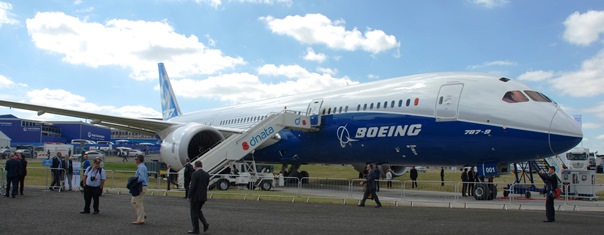 |
| Boeing, manufacturer of the 787-9 Dreamliner (above), logged over $40 billion worth of orders at the recent Farnborough Air Show in England. |
As multinational aerospace companies gathered at the Farnborough Air Show in England, the IAM and delegates from the IndustriALL Global Union met to confront challenges facing the millions of aerospace workers around the world.
The air show is a biennial pilgrimage that aerospace giants like Boeing, Airbus and Lockheed Martin, along with hundreds of smaller vendors and suppliers, use to buy and sell products to airlines and governments around the world. The week-long trade show gives industry insiders the chance to strike deals worth billions of dollars.
Collective orders at this year’s show totaled almost $168 billion.
 |
| IAM Canadian Chief of Staff Stan Pickthall explains the challenges facing aerospace workers in Canada at a meeting of IndustriALL Global Union delegates. |
Also present were representatives from over a dozen U.S. states looking to woo aerospace work, many of them touting low-wage workforces and anti-union laws. The industry is expanding rapidly in Central and South America, the Middle East and Asia.
“We meet at a critical time for our members and for aerospace workers throughout the world,” said IAM Chief of Staff and Director of Trade and Globalization Owen Herrnstadt.
“In every country we’re facing a very radical anti-union agenda that has gone beyond any realm of reasonableness,” said IAM Local 709 President Perry Gulledge.
Delegates from the U.S., U.K., Canada, France, Spain, Belgium, Japan and Sweden shared ideas on how aerospace workers can build union power, confront growing trends of outsourcing work and hiring contract employees, and fight attacks on retirement security.
Canadian unionists voiced concerns over an increasing push by conservative politicians there to adopt U.S.-style anti-union laws. In Europe, the restructuring of Airbus could mean thousands of lost jobs and is threatening the existing works council structure.
“Not surprisingly, companies are taking advantage of unfair trade agreements, low tariffs and woefully low wages,” said Herrnstadt. “There really is no tomorrow for us unless we get our collective action together today.”